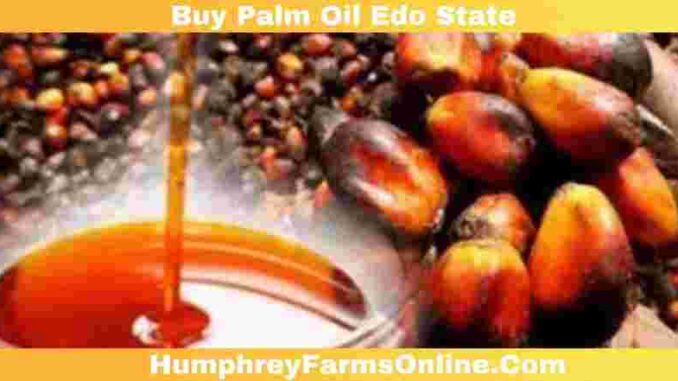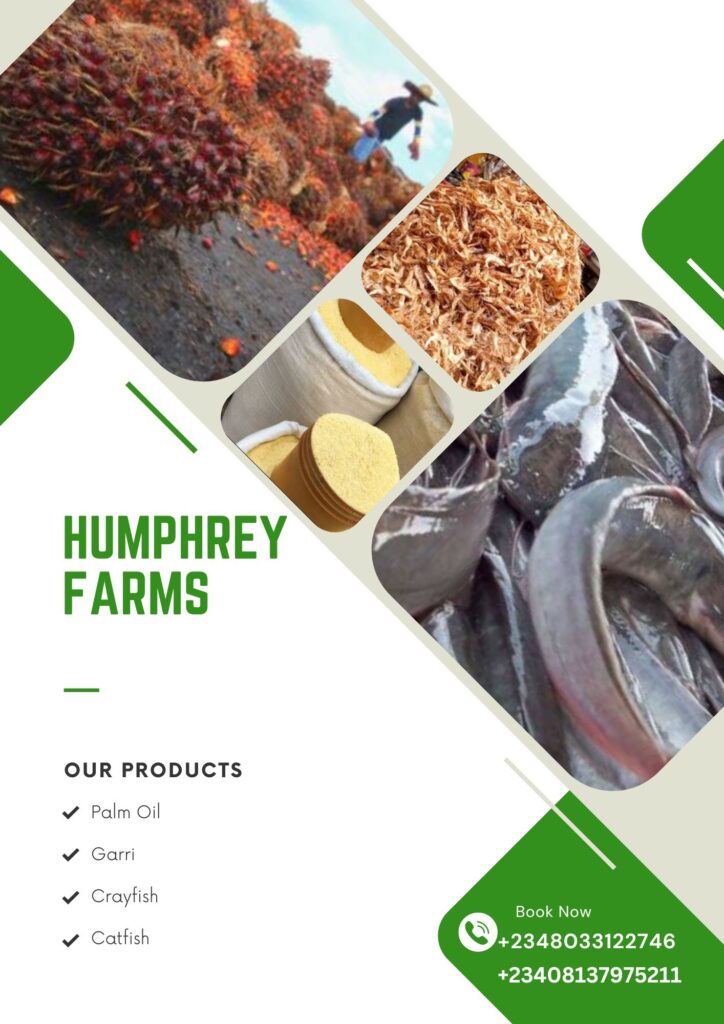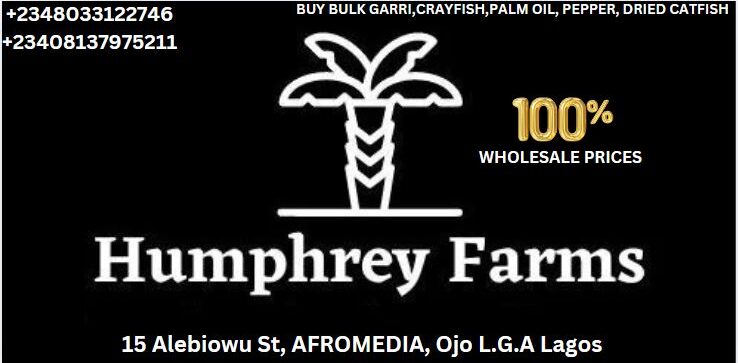
Buy Palm Oil Edo State: If you’re looking for top-notch palm oil in Edo State, your search ends here. Welcome to Humphrey Farms, where we combine tradition with innovation to bring you the finest palm oil directly from the heart of Nigeria. With our roots deeply embedded in Edo State and Lagos, we pride ourselves on being a leading name in the large-scale production and exportation of premium palm oil.
Buy Palm Oil Edo State
Also, Read
How Does Palm Oil Business Work?
How Profitable Is Palm Oil Business In Nigeria
Where To Buy Palm Oil In Bulk In Nigeria
Why Choose Humphrey Farms?
1. Unmatched Quality
At Humphrey Farms, quality is our top priority. We understand that the foundation of great palm oil starts with the best fresh fruit. Our plantations in Edo State benefit from the rich, fertile soil and optimal climate conditions that are perfect for growing high-quality palm fruit. Every drop of our palm oil is carefully processed and refined to ensure it meets international standards, providing you with a product that is pure, nutritious, and delicious.

2. Large-Scale Production
Humphrey Farms is not just a supplier; we are a powerhouse in the palm oil industry. Our advanced processing facilities and large-scale operations enable us to meet the demands of bulk buyers while maintaining consistent quality. Whether you’re a business looking for a reliable supplier or a distributor seeking to expand your product range, we have the capacity to deliver large quantities of premium palm oil.
Buy Palm Oil Edo State
3. Export Excellence
Our reach goes beyond Nigeria. With extensive experience in the exportation of palm oil, Humphrey Farms ensures that our products are not only available locally but also internationally. Our commitment to quality and reliability has earned us a reputation among global buyers, making us a trusted partner for palm oil across the world.
4. Local Presence with a Global Vision
While our branches in Edo State and Lagos, Nigeria, are the heart of our operations, our vision extends far beyond. We aim to bridge local excellence with global standards, offering our customers in Edo State and beyond access to world-class palm oil. Our team in both locations is dedicated to providing exceptional service and support to meet your specific needs.
Connect with Us
Ready to experience the Humphrey Farms difference? Getting in touch is easy:
- Phone/WhatsApp: +2348033122746, +23408137975211
- Email: [email protected]
Whether you’re looking to place a bulk order or have inquiries about our products, our team is here to assist you. Don’t settle for anything less than the best. Choose Humphrey Farms for premium palm oil that stands out in quality and consistency.
When To Buy Palm Oil Cheap In Nigeria?
Nigeria’s palm oil industry is brimming with opportunities for savvy investors and entrepreneurs. As a vital ingredient in countless household and industrial products, palm oil’s market dynamics offer both challenges and significant profit potential.
Understanding when and how to buy palm oil at the best prices can be a game-changer for anyone involved in this sector. Here’s a comprehensive guide to help you navigate the palm oil market and seize the best buying opportunities.
Understanding the Palm Oil Market Cycle
Palm oil prices in Nigeria are influenced by a variety of factors, including seasonal fluctuations and supply-demand dynamics. Here’s a closer look at the market cycle:
- Harvest Season (March to May):
During the harvest season, the market is flooded with palm oil as farmers bring in their fresh produce. This abundance typically drives prices down. For buyers, this is the optimal time to purchase palm oil at lower rates. If you’re looking to stock up or secure bulk quantities, this is the time to act. - Off-Peak Period (September to December):
The off-peak period is characterized by a noticeable decrease in palm oil supply. As the availability of fresh palm oil diminishes, prices can surge significantly, often doubling compared to the harvest season. For traders and bulk buyers, this is a crucial period to sell stock or prepare for higher prices if you’re planning future purchases.
Strategies for Buying Palm Oil Cheap
To maximize your investment, consider these strategies:
- Invest in Storage Solutions:
Setting up proper storage facilities allows you to buy palm oil in bulk during the harvest season when prices are low. With effective storage, you can maintain a steady supply throughout the year, avoiding the higher costs associated with off-peak periods. Ensure your storage solutions keep the palm oil fresh and uncontaminated to maintain quality and value. - Build Relationships with Suppliers:
Establish strong relationships with local palm oil producers and suppliers. By fostering these connections, you may gain access to better pricing and early information about upcoming harvests. This can give you an edge in purchasing palm oil before prices rise. - Monitor Market Trends:
Stay informed about market trends, including fluctuations in supply and demand. Keep an eye on weather conditions, which can impact harvest yields, and be aware of any changes in local and international market demands. This knowledge will help you make more strategic purchasing decisions. - Consider Direct Purchases from Farmers:
Buying directly from farmers can often result in better prices compared to purchasing through intermediaries. During harvest season, reach out to local growers to negotiate prices and secure bulk deals.
Exploring Opportunities in Palm Oil
Beyond timing your purchases, there are other lucrative opportunities in the palm oil industry:
- Oil Palm Plantations: Investing in oil palm plantations can be highly profitable given the right conditions and modern techniques. With the right variety of palm trees, such as the high-yield Tenera hybrid, you can maximize output and quality.
- Milling and Processing Plants: Establishing a palm oil mill allows you to process raw palm fruits efficiently, reducing waste and increasing profitability. Modern mills can handle large volumes and offer a steady income stream from processing fees or direct sales.
- Bulk Trading: Engaging in bulk trading involves buying palm oil during times of abundance and selling it during periods of scarcity. This approach requires strategic storage and market knowledge but can yield substantial profits.
======================================
Buy Palm Oil Edo State
Navigating the palm oil market in Nigeria requires a keen understanding of seasonal trends and strategic planning.
By capitalizing on the lower prices during the harvest season and employing effective storage and procurement strategies, you can enhance your profitability and secure a competitive edge in this vibrant industry.
As the demand for palm oil continues to rise, both locally and internationally, being informed and proactive will set you on the path to success.
For more information on how to take advantage of these opportunities or to explore partnerships, contact us at Humphrey Farms. We’re here to assist with all your palm oil needs and help you thrive in this exciting market.
Contact Us:
- Phone/WhatsApp: +2348033122746, +23408137975211
- Email: [email protected]
Seize the opportunity to make informed and profitable decisions in the palm oil industry today!
How Much Can Start Palm Oil Business?
Palm oil is a staple in Nigerian kitchens, making it a lucrative business opportunity for entrepreneurs. If you’re considering diving into the palm oil industry, understanding the various costs involved is crucial for planning and success. This guide will break down the essential expenses and factors to consider when starting a palm oil business in Nigeria.
1. Market Research and Feasibility
Before investing, conduct thorough market research to understand current palm oil prices, demand in your target area, and competitive landscape. This research will help you gauge potential revenue and pricing strategies. Look into local demand trends and identify your primary customers, whether they are local consumers, retailers, or industrial buyers. Understanding these aspects will provide you with a clearer picture of your initial investment needs.
2. Sourcing Raw Materials
The cost of sourcing raw materials, specifically palm fruits, is a significant factor. You have two main options:
- Cultivating Your Own Oil Palm Orchard: If you plan to grow your own palm trees, you’ll need to invest in land and orchard management. A typical 200-hectare plantation with a one-ton-per-hour (1tph) palm oil production line requires substantial investment. You’ll need to budget for land acquisition, planting, maintenance, and harvesting costs.
- Purchasing from External Suppliers: Alternatively, if you choose to buy palm fruits from other growers, you need to factor in the cost of acquiring fruit bunches. The price per ton of palm fruit will vary based on location and supply conditions. Additionally, consider the processing yield: how much oil you can extract from a ton of palm fruit.
3. Investing in Production Equipment
The cost of palm oil production equipment is a major consideration. The type and capacity of the equipment you need will depend on your desired scale of operation. Here’s a rough guide:
- Small-Scale Equipment: For smaller operations, you can start with basic equipment and gradually scale up as your business grows.
- Large-Scale Equipment: For a more significant operation, such as a full production line, you’ll need advanced machinery for processing, refining, and packaging. Compare prices from different suppliers to find equipment that suits your production volume and budget.
4. Construction and Infrastructure
The cost of setting up your production facility will depend on the scale of your operation:
- Small-Scale Operations: If starting small, you might only need a simple structure like a shed to house your equipment. This will reduce initial construction costs.
- Medium to Large-Scale Operations: For larger setups, you’ll need a dedicated factory space. This includes areas for machinery, raw material storage, oil tanks, and additional equipment. Factor in construction costs, including permits and utilities.
5. Start-Up Capital Requirements
The amount of start-up capital required varies based on the scale of your business:
- Producer Level: Starting a palm oil production business typically requires an investment of at least ₦2 million. This covers equipment, raw materials, facility setup, and initial operational costs.
- Retailer Level: If you’re entering the market as a retailer rather than a producer, your initial investment can be significantly lower. You might start with around ₦100,000 or more, which would cover purchasing and reselling costs, and setting up a small retail operation.
6. Operational Costs
Beyond initial investment, consider ongoing expenses such as:
- Labor Costs: Wages for workers involved in planting, harvesting, processing, and sales.
- Maintenance Costs: Regular maintenance of equipment and facilities to ensure smooth operation.
- Utilities and Overheads: Electricity, water, and other utilities required for production.
===============================================
Starting a palm oil business in Nigeria involves several key financial considerations, from market research and raw material costs to equipment and facility expenses.
By understanding these factors and planning your budget accordingly, you can set yourself up for a successful venture in this thriving industry.
Whether you’re aiming to become a large-scale producer or a local retailer, careful planning and investment will help you navigate the complexities and achieve your business goals.
For personalized advice and assistance with your palm oil business, feel free to reach out to industry experts and suppliers who can provide additional insights and support.

Leave a Reply
You must be logged in to post a comment.